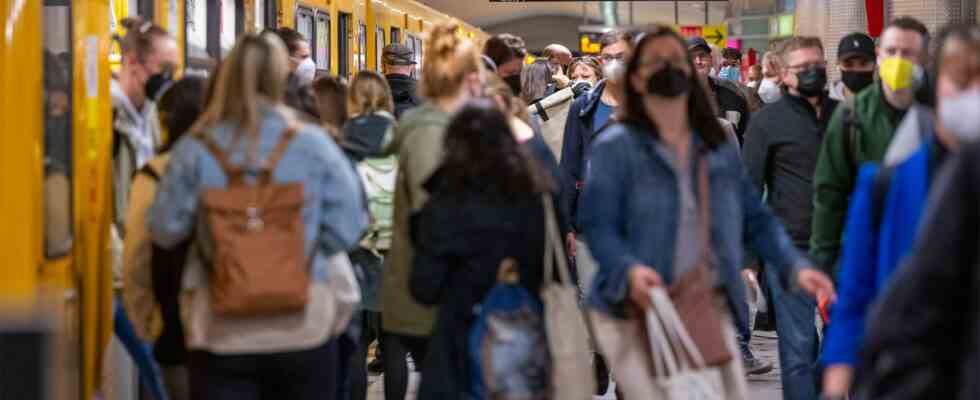Status: 08.06.2022 01:12 a.m
Chaos on the Pentecost weekend, but normal operation for shuttle traffic: The 9-euro ticket has been in effect for a week, which is intended to inspire people to use public transport on a permanent basis. But experts doubt the effectiveness.
For a group of young men who were out and about in tranquil Titisee-Neustadt in the Black Forest on Saturday, buying the 9-euro ticket was worth it. In the morning they set off from Lörrach, about two hours by train, to celebrate their friend’s bachelor party at Lake Titisee. “Thank you, 9-euro ticket,” they call into the camera of a television crew on site. Without the special offer, the tour would have been significantly more expensive.
In Baden-Württemberg, the route to Lake Constance is particularly popular at the weekend. The railways report full trains. While there was no great chaos here, the new desire to travel by train led to greater problems elsewhere. In Cologne, Hamburg and Berlin, platforms had to be temporarily closed due to the rush. In Stendal in Saxony-Anhalt, federal police officers helped to clear an overcrowded train. Some bicycle tourists were no longer taken along.
Transport companies draw a positive balance
The President of the Association of Transport Companies (VDV), Ingo Wortmann, on the other hand, draws a positive balance: “We expected very full vehicles and platforms for the Pentecost weekend and that has been confirmed.” According to Wortmann, evictions from vehicles remained the “absolute exception”. DB Regio reports that it has reacted to the expected increase in the number of customers and has put more than 50 additional trains on the rails. “We are literally moving everything we have – trains, buses, service staff,” says DB Regio boss Jörg Sandvoß. Nevertheless, as expected, “there were occasional peak loads, especially on the main tourist routes”. With 86,000 train journeys, however, DB Regio has sent everything that can roll onto the rails.
The works council of DB Regio, Ralf Damde, describes it to the editorial network Germany as follows: “As expected, the 9-euro campaign triggered a large run on regional trains, which led to significantly more cases of overload nationwide.” In total, there were more than 400 overcrowded trains on the first long weekend. In addition, according to Damde, there were 700 reports of overloads, disruptions or problems every day.
Mobility experts doubt the effectiveness
Mobility expert Andreas Herrmann from the Swiss University of St. Gallen can only shake his head at the reports of overcrowded German trains. “These were mishaps that were announced,” says the professor, who researches, among other things, micromobility in cities. The train was already at the stop before the 9-euro ticket. “Many trains are in need of repairs. The means of transport in Germany have been saved to death.” Herrmann believes that Deutsche Bahn will not be able to meet the additional demand. But the crucial question is also: “How do you influence the flow of traffic? First and foremost, it should relieve commuters and cause a shift from cars to trains. At the moment, additional traffic is being created, especially on weekends and during the holiday periods.”
So while the tourist routes are particularly popular in the first few days of the 9-euro ticket, urban traffic seems to remain relatively calm. “Since June 1st, quiet and normal everyday and commuter traffic has been observed in the SSB network, with even capacity utilization,” reports the Stuttgart Trams (SSB). To date, over 300,000 tickets have been issued. “The SSB managers suspect that the 9-euro ticket will result in higher passenger numbers, especially in regional and excursion traffic.”
So is the 9-euro ticket in danger of degenerating into a cheap “summer fun subscription” instead of providing impetus for a sustainable change in mobility? Mobility expert Herrmann is at least skeptical: “I’m not yet sure whether usage behavior will really change in the long term. It takes a lot before people permanently switch from cars to trains. The daily routine has to be completely reorganized,” says Herrmann. It is also about the question of how to get from home to the S-Bahn and from the station to work.
9-euro ticket: Bahn takes stock after Whitsun weekend
Julia Grünwald, MDR, daily news 12:00 p.m., June 7th, 2022
Political discussions about the time after
Federal Transport Minister Volker Wissing emphasizes that the campaign, which is limited to three months, is intended to take the opportunity “to get more people excited about public transport”. From the point of view of the federal states, however, more regionalization funds are needed in the long term. Baden-Württemberg’s Green Transport Minister Winfried Herrmann said: “Anyone who wants more people to use climate-friendly public transport in the long term must ensure that the infrastructure is expanded and additional vehicles are provided. Both require political will and more money.” The federal government’s decision against an increase in regionalization funds is therefore “a big mistake”. Consumer advocates are already warning of impending price increases after the end of the campaign and are calling for the introduction of permanently lower ticket prices.
The Black Forest tourists at Freiburg Central Station are not thinking about that at the weekend. They are happy about the opportunity to go on holiday at such a low price: “We come from Olpe am Biggesee and spontaneously bought the 9-euro ticket here and are thrilled,” says a woman with short, straw-blonde hair. Together with their cone sisters, they want to use the Pentecost weekend for hiking.

